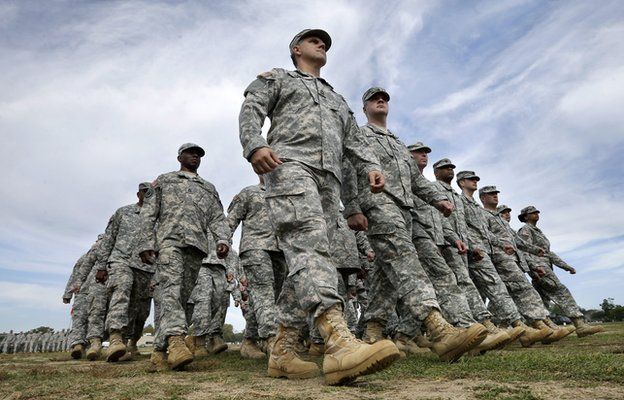Where does the phrase 'boots on the ground' come from?
- Published

"Boots on the ground" is shorthand for combat troops deployed in a foreign country. Barack Obama and David Cameron have both used it - it's a phrase that is constantly cropping up in the news. But where did it come from?
Infantry have been stomping in boots through mud and sand for centuries. Back in World War One "boot" was used as an alternative to "soldier", and a soldier's introduction to service was in "boot camp". But the expression "boots on the ground" appears to be relatively new.
British military officer Sir Robert Grainger Ker Thompson came close to using it in a 1966 book on his experiences of counter-insurgency in Malaya and Vietnam - chapter 15 was entitled Feet on the Ground. But that is not quite the same. The earliest known use of the precise phrase we use today occurs in 1980.
This was the conclusion reached by the late New York Times columnist, William Safire, who investigated the subject in 2008 with the help of an army historian. The historian rifled back through published sources until he found an instance of the expression in a Christian Science Monitor (CSM) story written during the Iranian Hostage Crisis. The reporter attributed the coinage to a US general, Volney Warner.
Grammarians would describe the use of "boot", in the phrase "boots on the ground", as a case of synecdoche - a figure of speech where the part represents the whole.
In English the expression is, by now, a bog-standard cliche (the military equivalent of "bums on seats"), but it can sound even worse in translation. "It's not used in Arabic because we have a problem with boots. Footwear in general in Islamic culture has this negative connotation," says Mohamed Yehia, of BBC Arabic. "Boots are something humiliating or unclean."
In Chinese the nearest equivalent is the term "iron hooves", which has negative connotations of a different kind, according to Howard Zhang of the BBC Chinese Service, conjuring up images of invading armies, with "all their cavalry and infantry trampling all over the place".
The first time Zhang heard the phrase, it was used to refer to the British, who once had their iron hooves on Chinese soil. But it was also used of the Americans, when the Chinese media railed against the iron hooves of the US in Vietnam, during the Vietnam war.
Subscribe to the BBC News Magazine's email newsletter to get articles sent to your inbox.